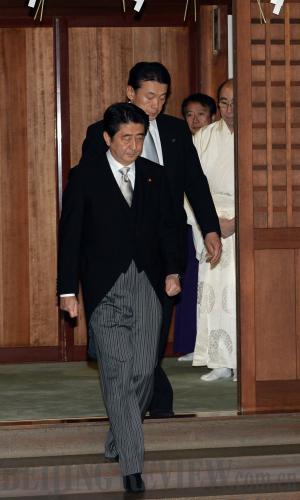|
 |
|
CONTROVERSIAL: Japanese Prime Minister Shinzo Abe visits the war-linked Yasukuni Shrine in Tokyo on December 26, 2013 (MA PING) |
Yin Shuzhang, 76, can never forget one winter night in 1943. It was the night when her family and a neighbor's family stayed in a small cave close to her village on the coast of east China's Shandong Province to hide from Japanese soldiers patrolling the area. She and her neighbor's 3-year-old son both caught a fever from the cold.
They were found by a soldier from the "Chinese Collaborationist Army," which was made up of Chinese soldiers forced into service by the Japanese. While the two families awaited their deaths in desperation, the soldier whispered to them, "I didn't want to be a traitor. The Japanese forced me with guns." He passed Yin a warm boiled egg, which was a luxury in those days, and left quietly. Yin survived, but the neighbor's son died three days later.
"In those days, things like this happened almost every day. Running away from the Japanese was routine," she recalled. "How can I forget those terrifying days?"
Yin's story is but one among thousands from the time of Japan's aggression in other Asian countries during World War II. People in China, Korea as well as countries in Southeast Asia were killed, raped, mugged and had their dignity trampled on during these years, which is why none of these countries can ever forget the aggression that they suffered at the hands of Japanese forces.
Unfortunately, Japan's official attitude toward its wartime history remains vague, with some even attempting to revise it or otherwise downplay the atrocities committed by their forefathers.
Japanese officials recently incited a major diplomatic incident when they paid tribute at the Yasukuni Shrine, which enshrines all Japanese soldiers that died in conflicts from the Boshin War (1868-69) up to the end of World War II, including 14 convicted Class A war criminals. Even after Japanese Prime Minister Shinzo Abe attracted condemnation from members of the international community—including many East Asian countries ravaged by the Empire of Japan's colonialism, as well as its own ally, the United States—Japanese Internal Affairs Minister Yoshitaka Shindo still paid a visit to the shrine on the first day of 2014. These visits not only heightened regional tensions, but aroused alert worldwide over Japan's increasingly right-leaning leadership.
"I cannot understand. Since when were murderers good people?" Yin asked.
Conservative estimates suggest that at least 35 million Chinese nationals were killed during the War of Resistance Against Japanese Aggression (1937-45). People like Yin wonder: Will Japan make a return to the political views of its past? Will the country retread the path it walked before?
The war-linked Yasukuni Shrine has long been seen as a symbol of Japan's past militarism. The 14 Class-A war criminals enshrined there include Hideki Tojo, who planned Japan's attack on Pearl Harbor in December 1941, and Abe's own grandfather Nobusuke Kishi, who was charged with Class-A war crimes though not tried or convicted.
| 